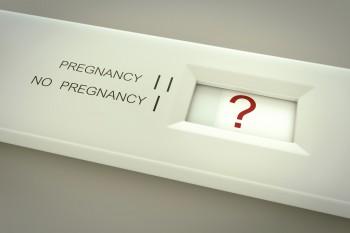Early Signs of Pregnancy (Before a Missed Period)

There are now home pregnancy tests that can confirm pregnancy a week before you miss your period. That means that just 7 days after ovulation occurs and conception begins, you may see a VERY FAINT pink line.
But for those of us that overanalyze everything, we need to know even earlier.
1 in 4 pregnancies naturally ends in miscarriage. There are also pregnancies called “Chemical Pregnancies,” which means that an egg and sperm may have met and tried to create a healthy fertilization, but something didn’t follow through. A chemical pregnancy is the term given when a faint positive test result shows prior to a missed period, but then the cycle begins within a few days of when it was due. The tests never grow darker and the hormones balance out quickly because they never rose above a very low amount.
Even knowing these statistics, there are some of us who obsess over our cycle, know our bodies so well that we can just tell when we are pregnant. Whether you have been trying without luck for months, or you are going to begin trying soon (or are in the window before you can test, but after you possibly conceived), this article is for you. 
Early Pregnancy Symptoms
Feeling ‘Off’ – Sometimes you can’t put a pin on it, but you just feel different; not really sick or unhappy, cranky, or blah – just ‘off.’ Your body may trying to tell you something!
Basal Body Temperature – If you are charting your cycles and following your basal body temperature (This is your internal temperature to the nearest hundredth instead of tenth), you will notice an upward shift. A BBT spike above baseline for an extended period of time (3-4 days) after ovulation means pregnancy. You may even see a triphasic chart, which means your BBT will do a third shift and increase again.
Cervical Mucus - Throughout your cycle, your cervical mucus varies and changes as your body produces an egg, it becomes (or does not become) fertilized, it implants or is shed. The mucus aids in fertilization, but typically dries if pregnancy does not occur. A creamy, continual mucus -a constant wet feeling- can be an early sign of pregnancy.
Cervix position – Before your period begins, your cervix shortens and opens to release the blood from your shedding uterus. You can learn to check your cervix to feel if it is low and open (not pregnant) or high and tight (possibly pregnant!).
Spotting – One of the most common first pregnancy signs is spotting. When the fertilized egg implants in the uterine wall, a small amount of blood may be shed.
Cramping – This will coincide with implantation as well as the spotting.
Regular PMS symptoms – The new hormones may trigger the same symptoms you have each cycle before your period begins.
Fatigue – You may notice you are falling asleep earlier or sleeping later – or in need of a nap.
Exercise Routine Changes – You may just feel different as you are working out; more tired, not up to your same routine. You may change things without even realize what you are doing.
The HCG hormone that is released in early pregnancy is rising fast. It may trigger many more symptoms before you take a pregnancy test, such as:
- Nausea
- Frequent urination
- Shortness of breath
- Sore breasts
- Constipation
- Headaches
- Back pain
- Dizziness and fainting
- Mood swings
- Food aversions
- Bloating
- Nipple darkening
- Cravings
- Runny nose, cold and flu symptoms
Of course the ultimate sign of pregnancy is a missed period.







